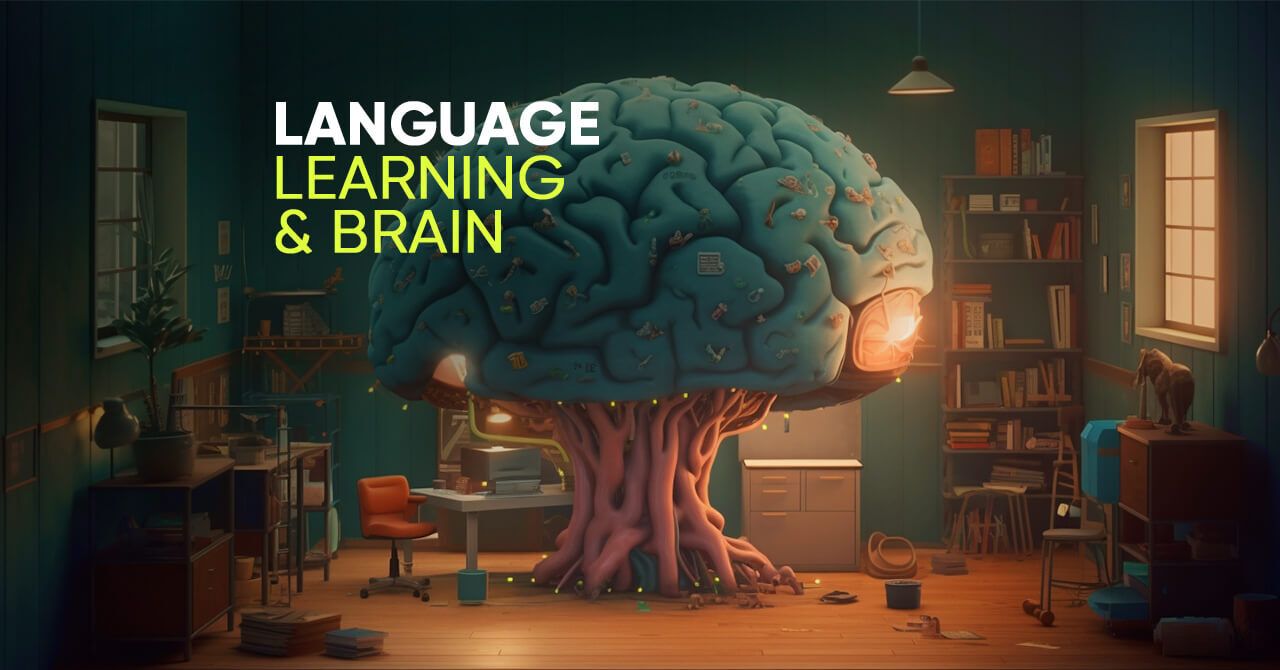
Language and the Brain: Boosting Cognitive Skills
Using a language—even our own—is a complex mental function that involves several areas of the brain.
Learning a new language is not just about memorizing words and grammar rules. It involves a complex cognitive process that engages several areas of the brain. During the process, our brain has to adapt to new sounds, grammar rules, and vocabulary. We all know how exhausting this can be at times, but it’s definitely worth the effort. Studies have shown that learning a foreign language can positively impact cognitive function, brain connectivity, and even mental health. Let’s see what is going on in our brains as we practice a new language and how good it actually is.
Language and the brain: what’s the link?
Using a language—even our own—is a complex mental function that involves several areas of the brain, including Broca’s area and Wernicke’s area. Broca’s area is responsible for articulating our thoughts, while Wernicke’s area allows us to comprehend the other party. These areas are connected by a bundle of nerve fibers called the arcuate fasciculus, which allows for the exchange of information between them. When we study a new language, we activate these areas of the brain, and by putting them to work, we allow our mental abilities to grow.
Growing gray matter
It is proven that bilingual individuals have denser gray matter in the brain compared to monolinguals. Gray matter is part of the brain that contains the cell bodies of neurons, and its function is to process information that comes to us. So basically, we get the chance to change the structure of our brains as we use them to learn a second language.
The aptitude for this kind of structural transformation in the brain is called neuroplasticity—the brain’s ability to reorganize old and create new neural connections in response to new experiences. Neuroplasticity is a key mechanism underlying learning and memory, and its role in language learning is crucial.
Is learning a new language good for your brain?
Yes, it definitely is. We’ve seen that it can lead to structural changes, such as denser gray matter in the language areas of the brain. Moreover, it enhances our brain’s ability to perform various mental processes by increasing brain connectivity. Now let’s see some key results of language learning.
How does learning a second language improve your memory?
Learning a language expands our memory by enhancing the brain’s neuroplasticity. We’ve seen what this term means, but we can also talk about this process in simpler terms.
Language learning involves lots of memorization, and we can imagine it as exercising and growing a memory muscle. The more we use it, the bigger and stronger it becomes. As a result, we get the ability to memorize other things more easily.
Other cognitive benefits of learning a second language
Learning another language isn’t just about improving memory—there’s so much more to it! Bilingual people—especially those who had the chance to grow in a multilingual environment—tend to have better focus, self-control, and working memory. Plus, they’re pretty good at switching between tasks and thinking styles—that’s called cognitive flexibility.
Mental health benefits
Learning a new language can also have a positive impact on mental health. Did you know that bilingualism can delay the onset of dementia and keep our brains vigorous even in older age? In simple terms, by doing our best to speak French, Spanish, Mandarin, Hungarian—or any other language that we choose—we are actively working on saving our brains from age-related decay. Language learning keeps us young, and it’s proven.
There’s even more. Studying a language can also reduce anxiety and stress, as it requires you to focus on the present moment and engage in a stimulating activity.
Other benefits of learning a new language
The advantages of studying a new language go beyond cognitive function. It can broaden our horizons, enhance our cultural awareness, and open up new opportunities in both personal and professional spheres.
How to learn a new language
There are several ways to learn a new language, including taking a language course, using language learning apps, or immersing yourself in a language environment. The most effective way to get a grasp of a new language may depend on your learning style and personal preferences. Consistent practice and immersion are key to language learning success, and to make this process even easier, you can easily get support from qualified and experienced tutors from around the globe on LiveXP.
Hello! My name is Valentina. Book digesting is my specialty. I transform book ideas into easy-to-follow summaries, articles, study guides, reviews, essays, analyses, slides, or e-books.

